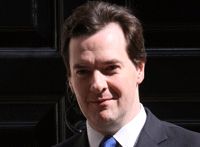
Now the comprehensive spending review guillotine has fallen, the messy chopping up what’s left with tiny local axes has begun. For children’s services this local bargaining looks to be crucial in determining the final impact of Treasurer George Osborne’s announcements last week.
Given the fear of another case like that of Baby P happening, it is likely that councillors will be convinced of the need to avoid huge cuts in child protection. However, children’s services are already facing, on average, overspends of about 8% because more children are going into care. This equates to about 542 foster placements for teenagers in a council with an annual children’s services budget of £170m.
The cost of keeping children in care forms about 50-60% of children’s services budgets, leaving Andy Sawford, chief executive of the Local Government Information Unit, with “huge concerns” over the support given to children already in care.
“Certainly there’s an argument for trying to get better value from care placements but I do wonder, with some of the more expensive placements, how sustainable that outlay will become for councils,” he says.
The options open to councils seem limited and all equally unattractive: squeezing providers of care placements will force many smaller agencies and children’s homes into bankruptcy; cutting preventive projects will increase numbers going into care; raising thresholds for access to services will mean more children at risk and a greater chance of another Baby P.
One option that is likely to look increasingly attractive is asking other agencies such as the police, health and education to share costs, particularly since schools and health have protected budgets.
Paul Ennals, chief executive of the National Children’s Bureau, agrees that schools must take on more of the burden of supporting families.
“To be successful, schools depend on a range of services that allow children to thrive in education and those services are facing cuts,” Ennals said. “Schools are now going to have to pick up that mantle.”
The great unknown is the new £2bn early intervention grant. This is not new money, nor is it ring-fenced. It includes the current funding for Sure Start children’s centres (£1.3bn), early years investment, teenage pregnancy, alcohol and substance misuses, tackling antisocial behaviour and prevention programmes for young people at risk of being not in employment, education or training. It is also likely to fund the new community budgets, to be rolled out nationally 2013-14. These will pool budgets from various departments and agencies and the first 16 pilots will look at families with multiple problems.
However, this is not a definitive list and the a spokesperson for the DfE has admitted the final list of existing money to be merged into the grant has not yet been decided but there will be announcements “in due course”.
All this before Graham Allen’s Early Intervention Commission has even reported on which are the most effective projects which councils should be funding. Allen agrees the £2bn will not be enough and he is hoping the government can be “nudged” into providing more money after he has reported. “But the symbolism of this is important. Early intervention is going up the political agenda,” he says.
What do you think? Join the debate on CareSpace
Keep up to date with the latest developments in social care. Sign up to our daily and weekly emails
Related articles
Read our round-up of the chancellor’s comprehensive spending review


 Bournemouth, Christchurch and Poole
Bournemouth, Christchurch and Poole  Hampshire County Council
Hampshire County Council  Lincolnshire County Council
Lincolnshire County Council  Norfolk County Council
Norfolk County Council  Northamptonshire Children’s Trust
Northamptonshire Children’s Trust  South Gloucestershire Council
South Gloucestershire Council  Wiltshire Council
Wiltshire Council  Wokingham Borough Council
Wokingham Borough Council  Children and young people with SEND are ‘valued and prioritised’ in Wiltshire, find inspectors
Children and young people with SEND are ‘valued and prioritised’ in Wiltshire, find inspectors  How specialist refugee teams benefit young people and social workers
How specialist refugee teams benefit young people and social workers  Podcast: returning to social work after becoming a first-time parent
Podcast: returning to social work after becoming a first-time parent  Podcast: would you work for an inadequate-rated service?
Podcast: would you work for an inadequate-rated service?  Family help: one local authority’s experience of the model
Family help: one local authority’s experience of the model  Workforce Insights – showcasing a selection of the sector’s top recruiters
Workforce Insights – showcasing a selection of the sector’s top recruiters 

 Facebook
Facebook X
X LinkedIn
LinkedIn Instagram
Instagram
Comments are closed.